Sacral Nerve Stimulation Market Research, 2032
The global sacral nerve stimulation market size was valued at $422.7 million in 2022, and is projected to reach $702.1 million by 2032, growing at a CAGR of 5.2% from 2023 to 2032. Sacral nerve stimulation is a medical procedure where a small device, called a neurostimulator, is implanted under the skin to deliver controlled electrical stimulation to the sacral nerves. These nerves are crucial for regulating bladder and bowel function. The neurostimulator is connected to electrodes placed near the sacral nerves, allowing it to modulate nerve activity and improve symptoms associated with conditions like urinary and fecal incontinence.
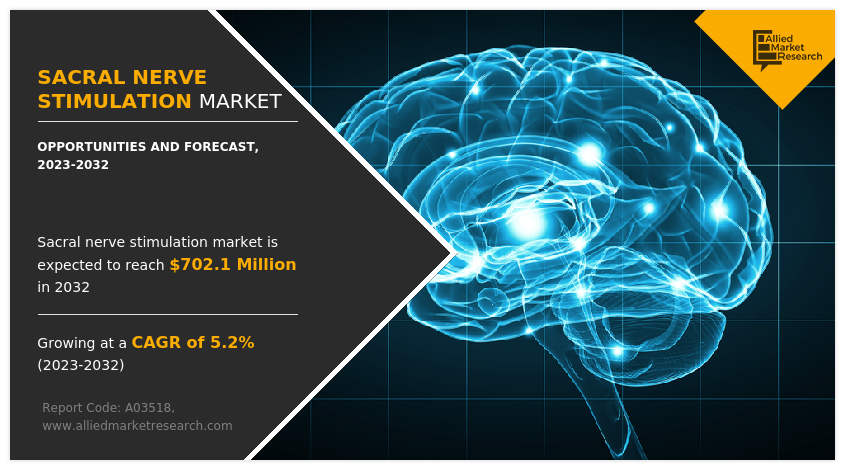
Market Dynamics
The major factors driving the sacral nerve stimulation market growth are increase in prevalence of urological conditions such as Urinary and Fecal Incontinence, Chronic Anal Fissure and Overactive bladder syndrome, surge in aging population, technological advancements, and rise in awareness about sacral nerve stimulation industry. Urinary incontinence is a common condition that affects millions of people worldwide. For instance, according to report of American Urological Association, quarter to a third of men and women in the U.S. suffer from urinary incontinence. That means about 33 million have overactive bladder representing symptoms of urgency. Thus, rise in prevalence of urological incontinence’s is driving the demand for sacral nerve stimulation as they serve as an effective treatment for this condition.
Further, aging population is increasing globally, which is driving the demand for sacral nerve stimulation. As people age, they are more likely to develop incontinence and other conditions that require the use of sacral nerve stimulation. In addition, aging can lead to bladder and pelvic floor muscles weaken, leading to a higher likelihood of urinary incontinence
Moreover, technological advancements in sacral nerve stimulation are driving the growth of the market. New devices are being developed with advanced features such as wireless connectivity, longer battery life, and improved programming. These advancements are improving patient outcomes and increasing the adoption of sacral nerve stimulation industry.
Furthermore, Innovations in the medical device industry and receival of approvals to cater to the unmet medical needs of massive pool of target population are expected to create lucrative opportunities for the expansion of the sacral nerve stimulation market forecast. For instance, in February 2022, Medtronic plc, a global leader in healthcare technology, received approval from the U.S. Food and Drug Administration (FDA) for InterStim X the next generation of the InterStim portfolio's recharge-free device – and it is available immediately. InterStim systems are the standard of care in advanced therapy options, and the most personalized system, to deliver sacral neuromodulation (SNM) therapy.
Further, increase in awareness of sacral nerve stimulation among patients and healthcare providers is expected to propel the market. Patients are becoming more aware of the benefits of these devices, and healthcare providers are recommending them as a viable treatment option for urological incontinence conditions.
In addition, availability of favorable reimbursement policies is boosting the growth of the sacral nerve stimulation market. Many governments and insurance companies are providing reimbursement for sacral nerve stimulation, making them more affordable for patients. This is increasing the adoption of these devices and driving the growth of the market.
However, sacral nerve stimulation are relatively expensive, which may limit their adoption among patients who cannot afford them or healthcare systems with limited budgets. Further, as with any surgical procedure, there is a risk of complications associated with the implantation of sacral nerve stimulation. These complications can include infection, bleeding, and nerve damage.
The demand for medical devices remains relatively stable even during economic downturns as they are necessary for diagnosing, treating, and monitoring health conditions. In addition, surge in aging population and the prevalence of urinary incontience, overactive bladder and others further supports the sustained demand for medical device such as sacral nerve stimulator.
Furthermore, technological advancements in the medical device industry also contribute to its ability to withstand recessions. Continued innovation leads to the development of new devices that improve patient outcomes, enhance efficiency, and reduce healthcare costs. However, various medical technology companies delaying capital expenditures, such as investments in research and development (R&D) due to threat of recession. Thus, fully scaral nerve stimulation market is moderately impacted by the recession.
However, as healthcare systems recover and growing focus on addressing the backlog of delayed incontinence diagnoses and treatments. This recovery is expected to contribute to the long-term growth of the sacral nerve stimulation market.
Moreover, the pandemic has highlighted the importance of healthcare innovation and technology. This has led to increased research and development activities in the medical device industry, including the development of new and innovative sacral nerve stimulation devices. Funding for these activities has also increased as governments and private investors recognize the need for improved devices to address incontinence conditions.
Furthermore, the adoption of telemedicine and remote patient monitoring has accelerated due to the pandemic. This shift towards virtual healthcare delivery has impacted the sacral nerve stimulation market opportunity as well. Remote programming and monitoring of sacral nerve stimulator devices have become more prevalent, allowing healthcare providers to manage patients' conditions without in-person visits. This trend is expected to continue beyond the pandemic, offering convenience and reducing the risk of infectious disease transmission, thus driving market growth in the forecast period.
Segmental Overview
The global sacral nerve stimulation market share is segmented into product, application, end user, and region. On the basis of product, the market is bifurcated into devices and accessories. On the basis of application, it is categorized into urinary fecal incontinence, chronic anal fissure and others (overactive bladder syndrome, urinary frequency). On the basis of end user, it is segregated into hospitals, specialty clinics and others (research centers, ambulatory surgical centers). Region wise, the market is analyzed across North America (the U.S., Canada, and Mexico), Europe (Germany, France, the UK, Italy, Spain, and rest of Europe), Asia-Pacific (Japan, China, Australia, India, South Korea, and rest of Asia-Pacific), and LAMEA (Brazil, South Africa, Saudi Arabia, and rest of LAMEA).
By Product
On the basis of product ,the devices segment accounted for largest share in 2022 and is expected to register highest CAGR during the forecast period owing to availability of sacral nerve stimulation devices and the rise in research and development activities focusing on advanced stimulators has fueled the growth of the devices segment. In addition, increasing adoption of sacral nerve stimulation devices by healthcare professionals is further driving the market growth.
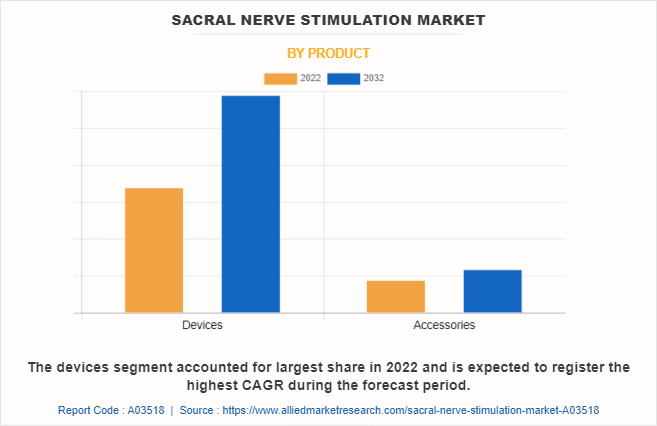
By Application
On the basis of application, the urinary fecal incontinence segment accounted for largest share in terms of revenue in 2022 and is expected to register highest CAGR during the forecast period owing to increasing prevalence of conditions such as obstetric trauma, voiding dysfunction, interstitial cystitis, and fecal impaction. These conditions lead to disruptions in bladder and bowel control, resulting in urinary and fecal incontinence. Thus, demanding targeted approach to address the underlying nerve dysfunction associated with these conditions. In addition the growing focus of market key players in development of stimulators for wide application are further driving the segment growth.
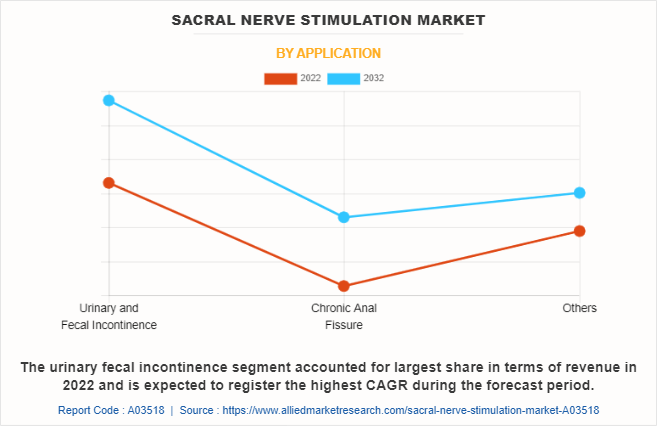
By End User
By end user, the hospitals segment accounted for largest share in terms of revenue in 2022, and is anticipated to register highest CAGR during the forecast period owing to availability and access to specialized healthcare professionals, advanced medical technologies & infrastructure, and strong relationships with insurance providers resulting in adoption of sacral nerve stimulation therapy.
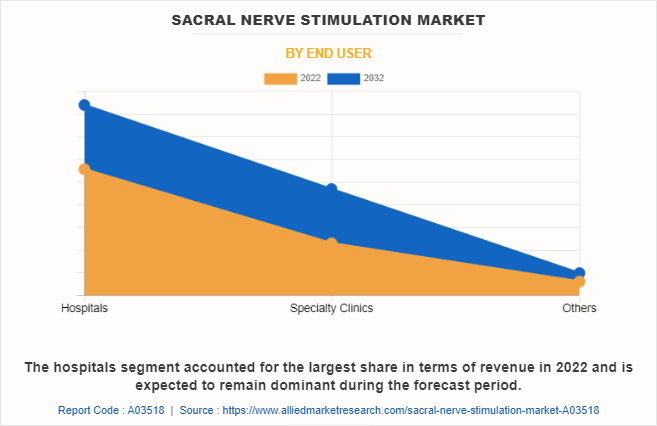
By Region
North America accounted for the largest share in terms of revenue in 2022 owing to high prevalence of urological incontinence conditions, availability of advanced healthcare facilities, and presence of major players offering sacral nerve stimulation devices. In addition, favorable reimbursement policies in healthcare systems and a rise in geriatric population are expected to propel the market expansion. However, Asia-Pacific is anticipated to witness notable growth, owing to rise in number of cases of overactive bladder and urinary incontinence conditions, increase in awareness regarding available Sacral nerve stimulation treatment devices, and surge in investments for development of effective Sacral nerve stimulation devices. Furthermore, upsurge in healthcare expenditure in emerging economies is anticipated to offer lucrative opportunities for market expansion.
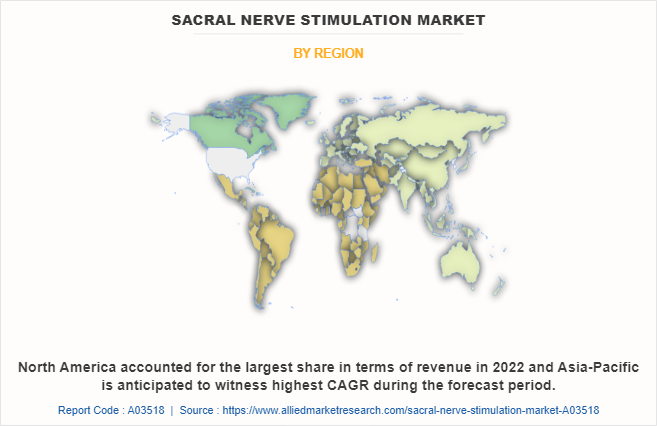
Moreover, the region has become a hub for sacral nerve stimulation market owing to its large population base, diverse patient pool, and relatively lower costs of sacral nerve stimulation implant surgery compared to developed countries. Furthermore, rise in research activities as well as well-established presence of domestic companies in the region are expected to provide notable opportunities for the market growth. In addition, rise in contract manufacturing organizations within the region provides is expected to open new avenues for the market growth.
Competition Analysis
Competitive analysis and profiles of the major players in the sacral nerve stimulation market such as Medtronic Plc, Beijing PINS Medical Co., Ltd, Saluda Medical Pty Ltd and Axonics, Inc. are provided in this report. Major players have adopted acquisition, product launch and product approval as key developmental strategies to strengthen their foothold in the sacral nerve stimulation market share.
Recent Product Approval in Sacral Nerve Stimulation Market
- In January 2020, Medtronic plc, a global leader in healthcare technology, received Mark for its InterStim Micro neurostimulator and InterStim SureScan MRI leads — clearing the technologies for commercial sale and clinical use in Europe.
- In February 2021, Medtronic plc, a global leader in healthcare technology, received approval from the United States Food and Drug Administration (FDA) for expanded MRI labeling of its InterStim II and InterStim Micro sacral neuromodulation (SNM) systems that use SureScan MRI leads. The updated MRI Guidelines allow for a wider range of MRI scan parameters and shorter wait time between MRI scans, thereby improving patient access to MRI exams and adding flexibility for MRI providers.
- In January 2023, Axonics, Inc., a global medical technology company that develops and commercialize novel products for the treatment of bladder and bowel dysfunction, received the U.S. Food and Drug Administration has approval for the company’s fourth-generation rechargeable sacral neuromodulation system-Axonics R20 neurostimulator.
Recent Acquisition in Sacral Nerve Stimulation Market
- In April 2023, Axonics, Inc.,a global medical technology company that develops and commercialize novel products for the treatment of bladder and bowel dysfunction,announced the acquisition of a lead placement solution from Radian, LLC that complements Axonics’ existing sacral neuromodulation (SNM) offering.
Key Benefits For Stakeholders
- This report provides a quantitative analysis of the market segments, current trends, estimations, and dynamics of the sacral nerve stimulation market analysis from 2022 to 2032 to identify the prevailing sacral nerve stimulation market opportunities.
- The market research is offered along with information related to key drivers, restraints, and opportunities.
- Porter's five forces analysis highlights the potency of buyers and suppliers to enable stakeholders make profit-oriented business decisions and strengthen their supplier-buyer network.
- In-depth analysis of the sacral nerve stimulation market segmentation assists to determine the prevailing market opportunities.
- Major countries in each region are mapped according to their revenue contribution to the global market.
- Market player positioning facilitates benchmarking and provides a clear understanding of the present position of the market players.
- The report includes the analysis of the regional as well as global sacral nerve stimulation market trends, key players, market segments, application areas, and market growth strategies.
Sacral Nerve Stimulation Market Report Highlights
| Aspects | Details |
| Market Size By 2032 | USD 702.1 million |
| Growth Rate | CAGR of 5.2% |
| Forecast period | 2022 - 2032 |
| Report Pages | 226 |
| By Product |
|
| By Application |
|
| By End User |
|
| By Region |
|
| Key Market Players | Saluda Medical Pty Ltd., Medtronic plc, Beijing PINS Medical Co., Ltd., Axonics, Inc. |
Analyst Review
Increase in demand for advanced sacral nerve stimulation device and rise in investments for research and development activities related to urological incontinence management, globally, are expected to offer profitable opportunities for the expansion of the market. In addition, favorable government initiatives and reimbursement schemes for sacral nerve stimulation have piqued the interest of several companies to develop advanced sacral nerve stimulation devices.
In addition that rise in expenditure on the development of healthcare infrastructure and surge in geriatric population are expected to boost the growth of the sacral nerve stimulation devices market. In addition, increase in burden of overactive bladder, urge incontinence, and other urological conditions across the globe results in rise in demand for sacral nerve stimulation devices, thus driving the growth of the market.
North America accounted for the largest share in terms of revenue in 2022, owing to high prevalence of urological incontinence conditions, availability of reimbursement policies, and presence of major players offering sacral nerve stimulation devices. However, Asia-Pacific is anticipated to witness notable growth, owing to rise in number of urinary and fecal incontinence, and overactive bladder cases, increase in awareness regarding available sacral nerve stimulation treatment devices, and surge in investments for development of effective acral nerve stimulation devices.
The total market value of Sacral Nerve Stimulation Market is $422.66 million in 2022.
The forecast period for Sacral Nerve Stimulation Market is 2022 to 2032
The market value of Sacral Nerve Stimulation Market in 2032 is $702.10 million.
The base year is 2022 in Sacral Nerve Stimulation Market.
Top companies such as Medtronic Plc, Beijing PINS Medical Co., Ltd., Saluda Medical Pty Ltd., and Axonics, Inc, held a high market position in 2022. These key players held a high market position owing to the strong geographical foothold in North America, Europe, Asia-Pacific, and LAMEA.
The devices is the most influencing segment in Sacral Nerve Stimulation Market , owing to owing to availability of sacral nerve stimulation devices, and rise in research and development activities focusing on advancing the stimulators. In addition, increasing adoption of sacral nerve stimulation devices by healthcare professionals further drives the market growth.
The major factor that fuels the growth of the sacral nerve stimulations market are increase in prevalence of urological incontinence ,technological advancements in sacral nerve stimulation devices and availability of medical reimbursement schemes.
A sacral nerve stimulation device is a medical device that delivers electrical impulses to the sacral nerves, which helps regulate neural activity and treat conditions such as overactive bladder, urinary incontinence, and fecal incontinence. It provides a minimally invasive treatment option by stimulating the nerves to restore normal bladder and bowel function.
Loading Table Of Content...
Loading Research Methodology...



